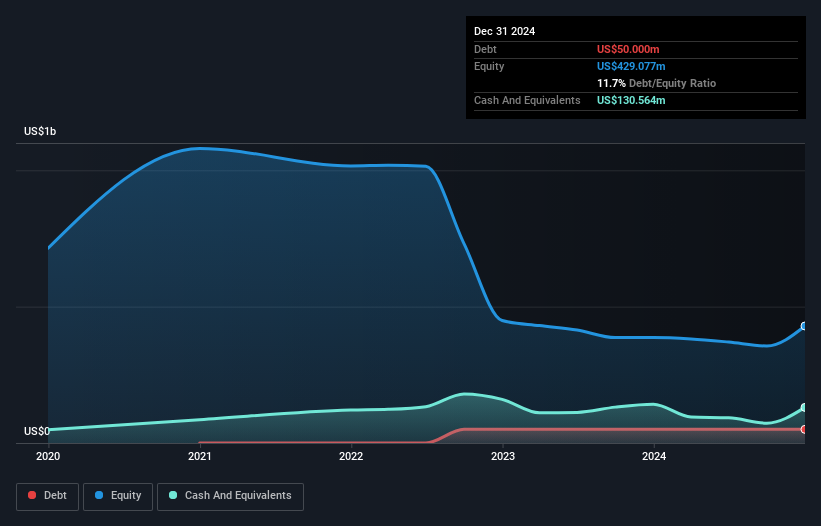Some say volatility, rather than debt, is the best way to think about risk as an investor, but Warren Buffett famously said that 'Volatility is far from synonymous with risk.' So it might be obvious that you need to consider debt, when you think about how risky any given stock is, because too much debt can sink a company. Importantly, Xperi Inc. (NYSE:XPER) does carry debt. But should shareholders be worried about its use of debt?
What Risk Does Debt Bring?
Debt and other liabilities become risky for a business when it cannot easily fulfill those obligations, either with free cash flow or by raising capital at an attractive price. In the worst case scenario, a company can go bankrupt if it cannot pay its creditors. However, a more usual (but still expensive) situation is where a company must dilute shareholders at a cheap share price simply to get debt under control. Of course, debt can be an important tool in businesses, particularly capital heavy businesses. The first step when considering a company's debt levels is to consider its cash and debt together.
What Is Xperi's Net Debt?
The chart below, which you can click on for greater detail, shows that Xperi had US$50.0m in debt in December 2024; about the same as the year before. But it also has US$130.6m in cash to offset that, meaning it has US$80.6m net cash.

A Look At Xperi's Liabilities
We can see from the most recent balance sheet that Xperi had liabilities of US$185.3m falling due within a year, and liabilities of US$53.3m due beyond that. On the other hand, it had cash of US$130.6m and US$141.8m worth of receivables due within a year. So it actually has US$33.7m more liquid assets than total liabilities.
This short term liquidity is a sign that Xperi could probably pay off its debt with ease, as its balance sheet is far from stretched. Simply put, the fact that Xperi has more cash than debt is arguably a good indication that it can manage its debt safely. There's no doubt that we learn most about debt from the balance sheet. But it is future earnings, more than anything, that will determine Xperi's ability to maintain a healthy balance sheet going forward. So if you're focused on the future you can check out this free report showing analyst profit forecasts .
See our latest analysis for Xperi
Over 12 months, Xperi made a loss at the EBIT level, and saw its revenue drop to US$494m, which is a fall of 5.3%. That's not what we would hope to see.
So How Risky Is Xperi?
By their very nature companies that are losing money are more risky than those with a long history of profitability. And we do note that Xperi had an earnings before interest and tax (EBIT) loss, over the last year. And over the same period it saw negative free cash outflow of US$72m and booked a US$14m accounting loss. But at least it has US$80.6m on the balance sheet to spend on growth, near-term. Overall, its balance sheet doesn't seem overly risky, at the moment, but we're always cautious until we see the positive free cash flow. The balance sheet is clearly the area to focus on when you are analysing debt. However, not all investment risk resides within the balance sheet - far from it. We've identified 2 warning signs with Xperi (at least 1 which is significant) , and understanding them should be part of your investment process.
If, after all that, you're more interested in a fast growing company with a rock-solid balance sheet, then check out our list of net cash growth stocks without delay.
New: AI Stock Screener & Alerts
Our new AI Stock Screener scans the market every day to uncover opportunities.
• Dividend Powerhouses (3%+ Yield)
• Undervalued Small Caps with Insider Buying
• High growth Tech and AI Companies
Or build your own from over 50 metrics.
Have feedback on this article? Concerned about the content? Get in touch with us directly. Alternatively, email editorial-team (at) simplywallst.com.
This article by Simply Wall St is general in nature. We provide commentary based on historical data and analyst forecasts only using an unbiased methodology and our articles are not intended to be financial advice. It does not constitute a recommendation to buy or sell any stock, and does not take account of your objectives, or your financial situation. We aim to bring you long-term focused analysis driven by fundamental data. Note that our analysis may not factor in the latest price-sensitive company announcements or qualitative material. Simply Wall St has no position in any stocks mentioned.
About NYSE:XPER
Xperi
Operates as a consumer and entertainment technology company worldwide.
Fair value with moderate growth potential.
Similar Companies
Market Insights
Community Narratives



